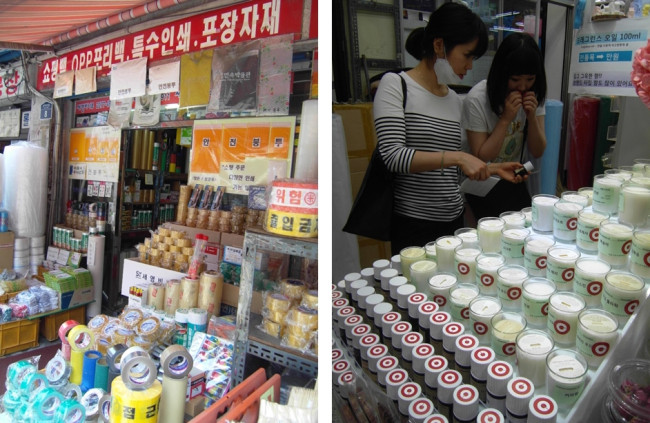[Market & Merchants] Bangsan Market ― where packaging meets aromatic materials
By Park Hyung-kiPublished : June 16, 2015 - 19:59
Bangsan Market in Jung-gu, Seoul ― just 6-7 minutes walk west from the renowned Dongdaemun Market ― may look like another traditional Korean market that sells all sorts of food and household accessories and products from the outset.
But as visitors walk toward the entrance of Bangsan Market, they will immediately feel and notice a difference on the street as they pass by specialty stores that sell faucets, wallpaper and lighting equipment mostly for businesses.
Walk a little more and step inside Bangsan Market, the first thing visitors will see are rows and rows of small packaging stores, displaying a variety of boxes, wrapping paper, shopping bags, printing materials and tape outside on the street.
But as visitors walk toward the entrance of Bangsan Market, they will immediately feel and notice a difference on the street as they pass by specialty stores that sell faucets, wallpaper and lighting equipment mostly for businesses.
Walk a little more and step inside Bangsan Market, the first thing visitors will see are rows and rows of small packaging stores, displaying a variety of boxes, wrapping paper, shopping bags, printing materials and tape outside on the street.

“This is a market mostly catered to small enterprises, like ventures and outsourcing firms of conglomerates that need plastic bags or paper boxes for their products,” said Shin Ki-young, 66, who has been running a box packaging business for about 40 years.
Formed in the 1970s, the market was set up where Bangsan Elementary School used to be. The name of the market is derived from the grade school.
The official address of the market shows that it is in Jugyo-dong. But it is called Bangsan Market because this is where Jugyo-dong and Bangsan-dong meet, according to Bangsan TMK, the operator and administrator of the market.
The market had been facing some difficulties amid the economic slowdown. The rising rent prices and the growing use of the Internet to purchase custom-designed packaging goods made it more difficult for someone like Shin to operate.

Also, with a growing number of conglomerates and food franchise operators outsourcing their packaging overseas, this street market is said to be going through a period of transition.
Then came the submarket of fragrance oil, flower and herb materials for air fresheners, diffusers and candles last year, which recently helped reinvigorate this market, said Jang Hwan-chool, CEO of Candlenara.
Jang runs two candle materials stores inside a building that used to house fabric producers and sellers. There are about 50 stores of fragrance and candle materials in the building.
“Customers, mostly young female shop owners, nationwide come here to buy the materials for their stores, like clothing retailers, coffee shops and beauty parlors, and they pass through the market’s packaging stores to get here,” Jang said.
The so-called “shop-in-shop customers” buy the materials, make candle diffusers and air fresheners on their own and sell them in their shops in addition to their core products, such as clothes or coffee, or services such as hair and nail treatment.
They also can easily make them with flowers to decorate the interior of their shops. The candles can be made to repel mosquitos or help people fall into a peaceful slumber.
“I personally call them low-cost healing products,” said Goh Yoo-mi, who opened two candle stores with her sister in the building a month ago.
“We are recently seeing foreign customers from Southeast Asian countries such as Cambodia seeking such an aromatic effect.”
If you go:
The market is open daily, with most shops operating from 8 a.m. to 8 p.m., and is a short walk from the Euljiro 4-ga Station (Lines No. 2 and 4), Exit 4.
By Park Hyong-ki (hkp@heraldcorp.com)
Although Dongdaemun and Namdaemun tend to dominate many lists of “must-see markets” in Seoul, small-scale markets that are equally full of history and character are scattered across the city. This is the eighth installment of a series introducing traditional local markets. ― Ed.







![[KH Explains] Hyundai's full hybrid edge to pay off amid slow transition to pure EVs](http://res.heraldm.com/phpwas/restmb_idxmake.php?idx=644&simg=/content/image/2024/04/18/20240418050645_0.jpg&u=20240419100350)






![[From the Scene] Monks, Buddhists hail return of remains of Buddhas](http://res.heraldm.com/phpwas/restmb_idxmake.php?idx=652&simg=/content/image/2024/04/19/20240419050617_0.jpg&u=20240419175937)

![[KH Explains] Hyundai's full hybrid edge to pay off amid slow transition to pure EVs](http://res.heraldm.com/phpwas/restmb_idxmake.php?idx=652&simg=/content/image/2024/04/18/20240418050645_0.jpg&u=20240419100350)

![[Today’s K-pop] Illit drops debut single remix](http://res.heraldm.com/phpwas/restmb_idxmake.php?idx=642&simg=/content/image/2024/04/19/20240419050612_0.jpg&u=)